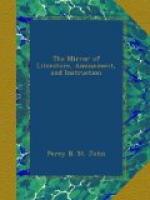(To the Editor.)
A correspondent having expressed a wish to obtain some knowledge of Dr. Katerfelto, of juggling memory, perhaps the following may be acceptable: Between thirty and forty years ago he travelled through the principal towns of the northern counties with a caravan filled with philosophical apparatus, giving lectures where a sufficient audience could be collected. He appeared to be about five feet ten, rather thin, and towards fifty. He was dressed in a black gown and square cap; his apparatus was in excellent order, and very well managed, he conducted every experiment with great certainty, never failing; and though much knowledge might be gained from his lecture, people seemed more inclined to laugh than to learn; perhaps from his peculiar manner, and partly from his introducing something ludicrous, as on exhibiting the powers of a magnet, by lifting a large box, he observed it was not empty, and on opening the lid, five or six black cats put up their heads, which he instantly put down, saying, “it is not your hour yet.” Also when about to prove the truth of what he advanced, by experiment, he had a strange way of calling your attention by saying, “But then look here,” raising his voice loud at the word “here.” The lecture was succeeded by a display of legerdemain, in which I thought him very superior to Breslaw.
It was said then, that he had originally been a soldier in the Prussian service, and had procured his discharge.
J.G.
P.
* * * * *
NOTES OF A READER.
* * * * *
PUBLIC EXECUTIONS.
Far better would it be if, in the few cases for which death ought to be inflicted, the execution were to take place within the walls of the prison, none being present except the proper officers, the clergyman, and those persons whom the sufferer might desire to have with him at his departure. The effect might possibly be impressive to some good end, which most certainly it is not now, if there were no other announcement than that of tolling a bell, when all was over, and hoisting a black flag, where it might be seen far and wide; and if the body of a murderer were carried under a pall, with some appropriate solemnity, to the place of dissection. Executions ought never to be made a spectacle for the multitude, who, if they can bear the sight, always regard it as a pastime; nor for the curiosity of those who shudder while they gratify it. Indeed, there are few circumstances in which it is not expedient that a veil should be drawn over the crimes and sufferings of our fellow-creatures; and it is greatly to be wished, that in all cases of turpitude and atrocity, no further publicity were given to the offence than is necessary for the ends of justice. For no one who is conversant with criminal courts, or has obtained any insight into the human mind, can entertain a doubt that such examples are infectious.—Qry. Review.




